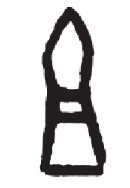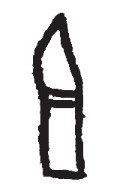Chapter 29 5. Recognizing ancestors and returning to their ancestors
Roman law is indeed amazing.
This is a system with strict logic and clear thinking.Public law and private law, private law is more important; personal law, property law, procedural law, personal law is more important; having personality, enjoying rights, and undertaking obligations, personality is more important; freedom, civil rights, family rights, freedom is more important.Security, freedom, and identity can all be realized through legal status. Isn’t it “not a totem, but better than a totem”?
In fact, the law is also "Superman".Law is for man and belongs to man, so it is "man".The law is abstract and universal, stern and selfless, and does not recognize relatives, so it is "not human".The dignity of the law is sacred and inviolable, and all people are equal before it, so they are "supermen".
Isn't the law "better than God than God"?
Replacing totems with laws is, of course, a move higher and smarter than "replacing totems with gods".
What about the Chinese?What has the totem become in China?
ancestors.
Ancestor worship is a cultural phenomenon with the most Chinese characteristics.For Chinese people in traditional society, the highest life goal is to "glorify the ancestors", and the minimum social obligation is to "carry on the family line"; once they make mistakes, suffer disastrous defeats, and are sanctioned, they are "ashamed of their ancestors".
So, what is "ancestor"?
The ancestor is the "oldest father".The oracle bone script of ancestors is a penis with the head of the penis exposed.It is also "and", which was originally a symbol of male reproductive worship.Such symbols can be found all over the world, but they are called "ancestors" in China.Those made of stone are called Shizu, and those made of pottery are called Taozu.Later, this thing got bigger and bigger, and it changed from sculpture to architecture.The towers of India, the obelisks of Egypt, are actually both.

The "ancestor" of oracle bone inscriptions (previously 1.9.6)

"And" in oracle bone inscriptions (A414)
(Obviously, just as the country and or are the same word, so are the ancestors and the same word. The country evolved from the tribe, and the ancestor worship was derived from the male reproductive worship.)
When the clan became a tribe, reproductive worship became totem worship; when the tribe became a nation, totem worship became ancestor worship.The ancestors are consistent to the end.Both the totem and the ancestor are male, and the ancestor must of course stick to his post.It's just that in the age of totems, it has to become animals, such as snakes, birds, cows, sheep, dragons and so on.But deep down, it's still the same thing.
Obviously, ancestors are a symbol of patriarchy and patriarchal politics.
However, totems sanctify male reproductive worship, while ancestors secularize totem worship.Therefore, the shape and meaning of "ancestor" will change.In the age of the clan, it was a genital; in the age of the tribe, it became a symbol; in the age of the state, it became the ancestral temple and the god.
The ancestral temple is the temple for the ancestors, and the god is the tablet of the ancestors.The gods should have existed first, and the method is to engrave the symbols of the male ancestors on the stone ancestors or Tao ancestors.Of course, he had to have pioneered the clan.Later, there were more and more ancestors, and the sex organs were no longer magnificent, so they were replaced by stone and wooden plaques, but they were still called "ancestors".In order to worship the gods, a house was built again, which is the "ancestral temple" or "ancestral temple", referred to as ancestors and ancestors.The "宀" (read like cotton) above the Zong character is the house; the "show" below is the tablet.
This is the new concept of "ancestor" - God and ancestral temple.The god is as important as a totem, and the Jongmyo is as lofty as an altar.Therefore, to establish a clan or family, one must first build a temple.With the ancestral temple as the center, the patriarch leads the clan to live, which is called "ji".If the ancestor is established, the family will be established, if the ancestor is alive, the family will live, and if the ancestor is destroyed, the family will die. This is called "destroying the temple and destroying the family".Such a nationality is of course called "ancestral home".
After entering the national era, the ancestor (ancestral temple or Jongmyo) became the symbol of the country.With the ancestral temple as the center, the monarch leads the people to live, which is called "country".If the ancestors are established, the country will be established, if the ancestors are there, the country will exist, and if the ancestors are destroyed, the country will perish.Such a country is of course called the "motherland".
Since China is the "country of ancestors", it will not be a kingdom of heaven, a kingdom of gods, or a country ruled by law.
So, what is China's system?

The "ancestor" of oracle bone inscriptions (previously 1.9.6)

"And" in oracle bone inscriptions (A414)
